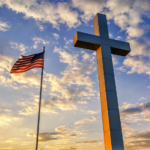This essay is part of our series on the relationship between Church and State. See the full collection of related articles here.
“Integralism” has been the subject of a few Public Discourse essays over the last couple of years. Most recently, Matthew Shadle argued against Thomas Pink’s contention that the Catholic “confessional state” is the ideal proposed by Catholic doctrine.
Self-described “integralists” such as Pink and Edmund Waldstein, O.Cist., do indeed argue that Church teaching, up to and including Dignitatis humanae, not only permits, but requires, a Catholic establishment wherever instituting one is feasible. Many of their arguments derive from Scriptural evidence, authoritative Church teachings, and the wider tradition of reflection that these texts anchor. For example, in his “Defense of Catholic Integralism,” published in Public Discourse in August 2018, Pink states plainly that “Integralism—the need for a confessional Catholic state—is part of Catholic teaching about grace.” Such theological arguments maintain that the requirement of a Catholic state can be deduced from realities such as Christ’s kingship; the nature, scope, and universal bindingness (if you will) of the truth of Catholicism; and the jurisdiction and prerogatives of the Catholic hierarchy.
Admittedly, the reflections of integralists like Pink and Waldstein have the flavor of thought experiments. They realize that it is not only far-fetched to speak of a Catholic confessional state today, but that it would be unconstitutional for any state authority to “confess” (and thereby to “establish”) Catholicism in the United States. Apart from this constitutional prohibition, the practical appetite for such a confession, even among Catholics, is very small.
Start your day with Public Discourse
Sign up and get our daily essays sent straight to your inbox.Yet the arguments of integralists are nonetheless worth taking very seriously, for their reflections include spot-on diagnoses of many pathologies affecting our political community. Their prescriptions—short of actually “establishing” Catholicism—are often correct.
In this short essay, I leave aside theological arguments from the top down, and focus on what I call Pink’s arguments from below. These arguments are more easily grasped—and more sound—than those that descend. In fact, they are nearly compelling. But the conclusion that they nearly compel is not a Catholic confessional state. It is instead something very much like what the founders put in place, and what most Americans right up to the 1960s warmly embraced—and what we should still support.
In short: these arguments lead to the conclusion that the First Amendment, which prohibits a confessional state, is actually a very good idea indeed.
Natural Theology and the American Founding
The constitutional settlement that endured for almost two centuries until it was abandoned by elites (including the Supreme Court) and uprooted in the 1960s was basically this: public authority could and should promote religion and partner with religious institutions for projects that are conducive to the common good, without coercion and without partiality toward any particular faith or sect. This settlement was no small matter, for the founders and many millions of Americans after them quite rightly held that a free society could be maintained only by a virtuous citizenry possessed of theistic faith and convinced of the truth of biblical morality. (Attorney General William Barr’s brilliant and courageous speech at Notre Dame Law School on October 11 is faithful to this tradition. That so many commentators treated it as if an Ayatollah had taken over the Justice Department shows how very far elites have dragged our body politic from its moorings.)
Crucially, this settlement included the political community’s affirmation of certain truths about God. These affirmations did not include sectarian tenets, theological speculation, or putatively revealed truth. They did include divine realities affirmed in the Declaration of Independence—a unitary God who created all there is, who providentially guided human events, and whose effects included naturally known moral truths—truths that could be known and were known by reason alone.
These truths are elements of a “natural theology” or “natural religion,” really a branch of philosophy. They are fruits of reflection on the existence and nature of God using only the power of human reason, operating on data available to everyone. Respect for and belief in these “self-evident” truths was part of the common good, which the public authority had a duty to promote.
The founders’ pivotal insight was that the truth about sectarian matters—sacred doctrine, modes of worship, forms of church polity, rules for church membership in good standing—could be kept out of political life. Such matters were not unimportant. But arbitrating them need not be the civil magistrate’s task. Theologians might contend over the details of faith and worship. But to the statesman they could be matters of opinion.
Note well: the First Amendment stipulates that the truth or falsity of putatively revealed propositions is beyond the scope of authoritative resolution by those with care of our political society. The First Amendment does not say, or suppose, or even suggest that all such propositions are in reality somehow equally true (or false), or that they have at most the “truth” of poetry, or that all such alleged revelations are fantastical or mere human projections. Not at all: the First Amendment was ratified by a population that took the tenets of natural and revealed religion most seriously. It has been supported by countless Americans—notably including America’s Catholics—since. By recognizing and affirming the truths of natural religion—including the truth that a divine entity created what there is and sustains it in being out of providential care for humanity—America’s political leaders implicitly endorsed the entailment that such a divine entity would communicate somehow with humankind. They endorsed, in other words, the proposition that genuine revelation is not only possible, but likely.
This is the context in which to consider the arguments of Catholic integralists in favor of the “confessional state.”
Political Authority, Grace, and the Common Good
Thomas Pink is exactly right when he writes that with “political secularization we find states . . . departing from natural law on an ever-widening field of issues, including abortion, euthanasia, and marriage.” Moreover, the “secularizing state bears increasingly false witness to the common good. It moves with depressing speed, in many countries, to repress and marginalize opposing Christian witness to the natural law in public life.” The argument becomes less certain when Pink turns to why, or perhaps better, how, a public confession of Catholicism gets the “state” on track. In one articulation of his answer, Pink seems not to seek to establish more than what I have already argued for here, which isn’t a Catholic “establishment,” but something like a Christian Commonwealth.
Pink writes:
The reason is that the state’s grasp of public reason depends on its public commitment to religious truth. This is owing to the Fall, which has not destroyed human reason, but which has still seriously corrupted it. Divine grace, received with faith and through the sacraments, is needed as gratia sanans to restore our damaged rationality. This is true not just in relation to private reason but in relation to public reason too. Baptism obligates Christians, where they can, to commit their political community publicly to Christ.
All that Pink recommends in the preceding paragraph could be accomplished if ordinary citizens, along with those of their number who exercise public authority, put into practice (where appropriate) all the moral and religious truths they hold, a project that clear-headed reasoning requires, and for which a Catholic “establishment” is unnecessary. Pink adds that the “state should be Catholic, or at least broadly Christian, not because the state is a believer to be saved as an individual is, but because political authority has been divinely established to confess public reason in the service of a genuinely common good.”
Again, these persuasive concerns could be made operational without a Catholic “confessional” state, as Pink perhaps implicitly recognizes by stating the alternative, “broadly Christian.” And America for most of its history has had a “broadly Christian” state, though never a Catholic one.
At the heart of Pink’s argument are echoes of several pontiffs who maintained that, in some decisive way, without “grace” and perhaps other supernatural help or ecclesiastical ministrations—or both—even the most reasonable human persons could not effectively promote the common good. Pink quotes Pope Pius IX, who warned in Quanta Cura that “where religion has been removed from civil society, and the doctrine and authority of divine revelation repudiated, the genuine notion itself of justice and human right is darkened and lost.” He quotes Pope Leo XIII to similar effect. He does not quote Pope Saint Pius X, who wrote in his condemnation of the French Silonists, “there is no true civilization without its being moral civilization, and there is no true moral civilization without the true religion: this is a truth demonstrated; it is a fact of history.”
That “Human reason requires repair through grace” is the root claim in this part of the integralist case. The challenge to the integralists, though, is to show how that salve can be applied to the “state,” save by and through the reasoning (influenced by grace) of the persons who exercise public authority. That these persons exercising public authority—which, in a democracy, finally includes all persons who vote, serve on juries, and trade political opinions in private and in public—should come to Catholic faith is an end devoutly to be prayed for. But this great good must be brought about seriatim, and by appeal to each one’s freedom and intelligence. That is the legacy of Madison and the founding, of Dignitatis humanae, and indeed of the Gospel. In other words, public servants (as all others) need to be converted.
It might be supposed that this process could be jump-started, and the halcyon influence of the Church accelerated, by “establishing” Catholicism. It is impossible to say for sure. But it is certain that “grace” does not work automatically, as the depredations of so many officially Catholic kingdoms and states throughout history sadly make clear. It might instead be that at or just below the surface of the integralists’ arguments is a deeply conservative social theory, one in which the doctrine of the Church, the supernatural incentives of the faith, and the cultural authority of the clergy, are all thought to be essential to adequate peace and order. This is not an altogether implausible claim, but neither is it obviously correct. The burden of showing that it is true rests upon those who assert that it is so.
In the meantime, Catholics both clerical and lay should bear perspicuous witness to the truth in season and out of season, and never lose their grip on all the truths that they hold.













